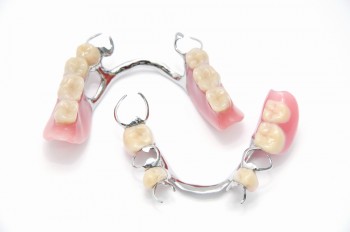Broken or Cracked Dentures

You depend on your dentures all day long. They help you eat, smile, give you a boost in your profile and improve self-confidence. If your denture breaks or cracks, it can put a major kink in your day.
What To Do
Unfortunately, there’s not much a person can do by themselves to correct a broken or cracked denture. You’ll need to contact your dentist as soon as you notice something wrong, so that you can work together to make an action plan. In most cases, your denture will need to be replaced. Fractures or cracks can greatly compromise the integrity of prosthesis such as a denture or partial denture. Trying to patch it back together may buy you time, but it won’t withstand everyday use that you depend on it so greatly for. Smaller areas of damaged such as broken clips may be able to be repaired in the lab if you bring the denture to your dentist for them to inspect.
Potential Causes
- Dentures can break or crack due to the prosthesis being extremely worn and unable to withstand the pressure of biting or chewing in key pressure points.
- Proper care of your denture can extend the life of the prosthesis. We recommend taking your denture out every night and soaking it with water as well as a denture-cleansing tablet. This keeps the material from becoming dried out and brittle. It also loosens plaque deposits so that it can be brushed clean in the morning before putting it back into your mouth. Storing your denture out of water can cause it to dry out as well as make it more uncomfortable to wear.
- Attempting to repair your denture on your own may damage some of the materials, causing a break or crack in the prosthesis to be even worse. Never attempt to fix or alter your denture on your own…leave it to your dentist! Doing so might also alter any type of warranty that the denture manufacturer, lab, or dentist offers on the treatment.
Risks Of Not Treating
Without having a comfortably fitting denture, you can experience complications like:
- Sore, raw areas on the gum tissues under your prosthesis
- Bone recession in areas of excess pressure
- Weight loss; nutritional deficiencies caused by inability to eat a balanced diet
Not having a properly functioning denture or partial can make it impossible to get through each day comfortably. From eating to speaking, you’ll find that a broken denture makes it difficult to perform even the most basic daily functions. Discussing repair or replacement with your dentist is best done as soon as you begin noticing something wrong with your denture.
Benefits Of Treating
Minor cracks or problems with a denture may be able to be treated fairly easily if they are addressed right when it happens. Otherwise small cracks can act like a run in fabric…becoming longer and longer, and more difficult to stop.
If a new denture is made, it can prevent damage to your bone or soft tissues caused by an ill-fitting, broken prosthesis. Ill-fitting devices not only irritate gum tissue, they also cause irreversible bone loss due to irregular pressure placed inside of the mouth.
If you are caregiver for a loved one who has a broken or cracked denture prosthesis, you may want to take into account that they’re unaware of whether or not they are experiencing discomfort or problems with their device. Slow, gradual wear or damage may not suddenly bother them. Changes in diet or speech can be gradual and go unnoticed.
Alternative Treatments
Your dentist will make every effort possible to repair your denture. Depending on what type of damage has taken place though, a completely new denture may be needed.
There are several types of dentures available for patients to choose from:
Implant-supported dentures – These dentures are permanent prosthetics that is anchored into place onto as few as 4 implant roots. An implant-supported denture also eliminates for acrylic or metal across the roof of the mouth, making it easier to speak and eat.
Immediate dentures – Do you have a denture that needs to be replaced as well as some teeth in need of extracting? An immediate denture is placed as soon as the teeth are removed, over the extraction site. In about 2 weeks, the denture is adjusted or re-lined to have a close fit with the freshly healed extraction areas.
Conventional dentures – Traditional dentures are made by taking an impression of the mouth and creating a custom-fitted denture from the mold. The final prosthesis is delivered in approximately 2 weeks.
You can’t make it through another day if you have a broken denture. Schedule an appointment with your dentist today to find out if your prosthesis is repairable or needs to be replaced.


